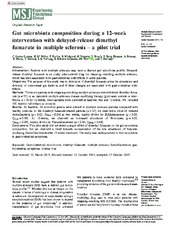| dc.contributor.author | Storm-Larsen, Christopher | en_US |
| dc.contributor.author | Myhr, Kjell-Morten | en_US |
| dc.contributor.author | Farbu, Elisabeth | en_US |
| dc.contributor.author | Midgard, Rune | en_US |
| dc.contributor.author | Nyquist, Kaja Beate | en_US |
| dc.contributor.author | Broch, Line | en_US |
| dc.contributor.author | Berg-Hansen, Pål | en_US |
| dc.contributor.author | Hov, Johannes Espolin Roksund | en_US |
| dc.contributor.author | Holmøy, Trygve | en_US |
| dc.date.accessioned | 2020-08-07T11:03:59Z | |
| dc.date.available | 2020-08-07T11:03:59Z | |
| dc.date.issued | 2019 | |
| dc.Published | Storm-Larsen C, Myhr KM, Farbu E, Midgard R, Nyquist KB, Broch L, Berg-Hansen PBH, Hov JR, Holmøy T. Gut microbiota composition during a 12-week intervention with delayed-release dimethyl fumarate in multiple sclerosis – a pilot trial. Multiple Sclerosis Journal, Experimental, Translational and Clinical. 2019;5(4) | eng |
| dc.identifier.issn | 2055-2173 | |
| dc.identifier.uri | https://hdl.handle.net/1956/23546 | |
| dc.description.abstract | Introduction: Patients with multiple sclerosis may have a distinct gut microbiota profile. Delayed-release dimethyl fumarate is an orally administered drug for relapsing–remitting multiple sclerosis, which has been associated with gastrointestinal side-effects in some patients. Objectives: The purpose of this study was to determine if dimethyl fumarate alters the abundance and diversity of commensal gut bacteria, and if these changes are associated with gastrointestinal side-effects. Methods: Thirty-six patients with relapsing–remitting multiple sclerosis received either dimethyl fumarate (n = 27) or an injectable multiple sclerosis disease-modifying therapy (glatiramer acetate or interferons, n = 9) for 12 weeks. Stool samples were collected at baseline, two and 12 weeks. We included 165 healthy individuals as controls. Results: At baseline, 16 microbial genera were altered in multiple sclerosis patients compared with healthy controls. In the dimethyl fumarate-treated patients (n = 21) we observed a trend of reduced Actinobacteria (p = 0.03, QFDR = 0.24) at two weeks, mainly driven by Bifidobacterium (p = 0.06, QFDR = 0.69). At 12 weeks, we observed an increased abundance of Firmicutes (p = 0.02, QFDR = 0.09), mostly driven by Faecalibacterium (p = 0.01, QFDR = 0.48). Conclusions: This pilot study did not detect a major effect of dimethyl fumarate on the gut microbiota composition, but we observed a trend towards normalization of the low abundance of butyrate-producing Faecalibacterium after 12 weeks treatment. The study was underpowered to link microbiota to gastrointestinal symptoms. | en_US |
| dc.language.iso | eng | eng |
| dc.publisher | SAGE | eng |
| dc.rights | Attribution-Non Commercial CC BY-NC | eng |
| dc.rights.uri | http://creativecommons.org/licenses/by-nc/4.0/ | eng |
| dc.title | Gut microbiota composition during a 12-week intervention with delayed-release dimethyl fumarate in multiple sclerosis – a pilot trial | en_US |
| dc.type | Peer reviewed | |
| dc.type | Journal article | |
| dc.date.updated | 2020-02-04T08:19:13Z | |
| dc.description.version | publishedVersion | en_US |
| dc.rights.holder | Copyright 2019 The Authors | |
| dc.identifier.doi | https://doi.org/10.1177/2055217319888767 | |
| dc.identifier.cristin | 1790210 | |
| dc.source.journal | Multiple Sclerosis Journal, Experimental, Translational and Clinical | |

